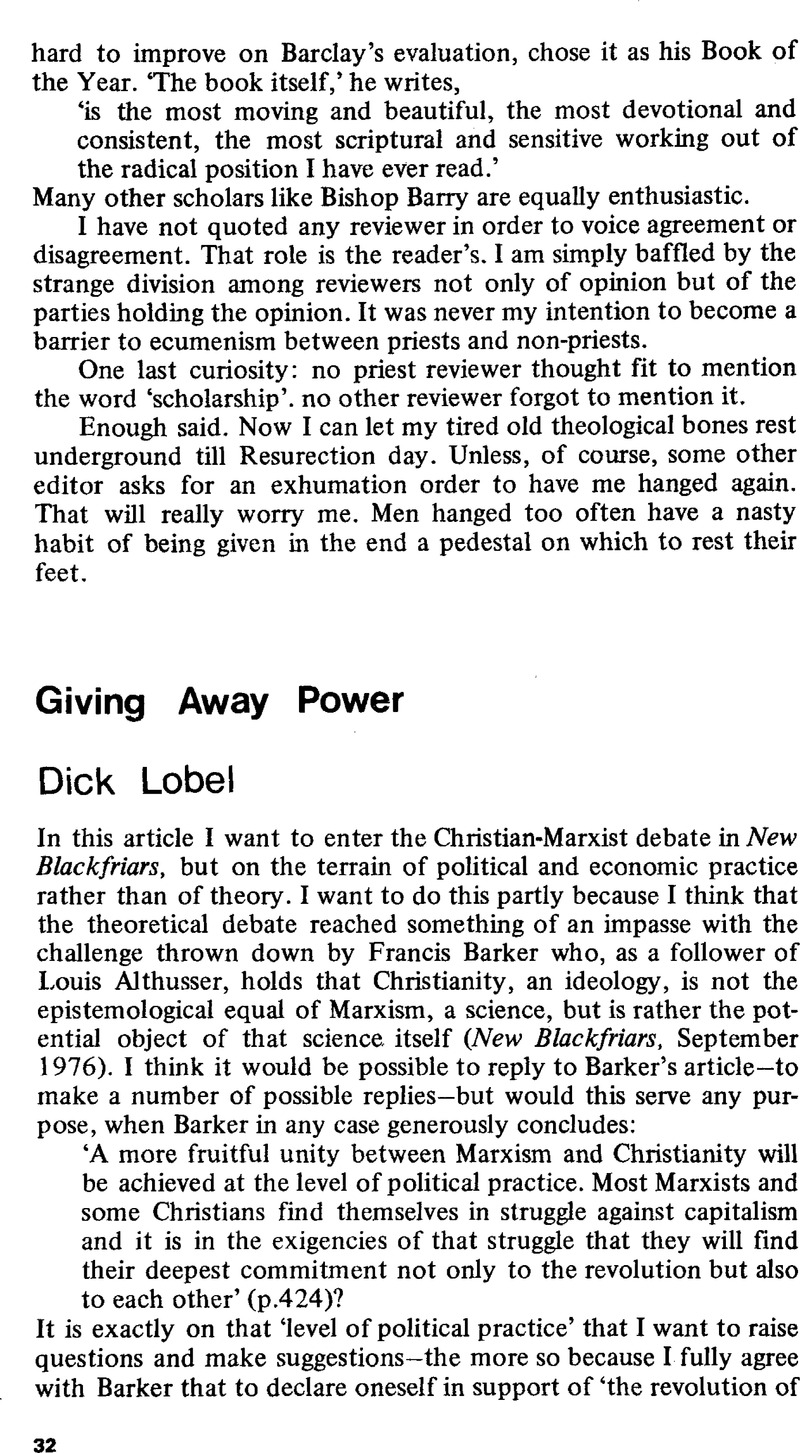No CrossRef data available.
Article contents
Abstract

- Type
- Other
- Information
- Copyright
- Copyright © 1978 Provincial Council of the English Province of the Order of Preachers
References
1 For Marx. Lane, Allen, The Penguin Press, 1969, p.193Google Scholar (footnote).
2 Lenin and Philosophy, NLB, 1971, p.24Google Scholar.
3 If for statistical purposes the death rate of skilled manual workers and their families is taken as an average, unskilled manual workers have a forty‐three per cent greater chance of dying from killer diseases, professional workers a twenty‐four per cent lesser chance See Sunday Times Colour Magazine, 26 September 1976.
4 The setting up of Law Centres in working class districts is a good example of what I mean. This was a recognition that even though legal aid was available, scarcity of solicitors in certain areas or deeply ingrained social and cultural responses prevented working class people from approaching and using the law; the law had to go to them. While this was an excellent response to a particular social problem, it did not, and could not, alter the fundamental social structure which caused the problem in the first place.
5 Lenin and Philosophy, p.96.
6 Socialism, Utopian and Scientific
7 Bettelheim, Charles, The Transition to Socialist Economy, Harvester Press, 1975, pp. 9, 11Google Scholar.
8 Times Books, 1976.
9 Lenin and Philosophy, p.9.
10 Marx, Capital Vol. 3,Google Scholar F.L.P.H. Moscow, 1962, p.380.
11 See Fernbach, ed. Marx: The First International and After, Political Writings Vol. 3, Penguin, 1974, p.90.
12 I have mainly used the translation by Eden and Cedar Paul (Dent 1930) also consulting the translation by Ben Fowkes, Penguin, 1976.
13 Marx himself seems to suggest this by his use of political metaphors at one point in the Instructions for Delegates to the Geneva Congress, where he calls the capitalist system ‘despotic’ and the workers' co‐operative ‘republican’. See Fernbach, op. cit. p.90.
14 cf. Rosa Luxemburg: ‘Freedom for the supporters of the government alone, freedom only for the members of one party‐however numerous they may be‐that is no freedom at all. Freedom is always freedom for the one who thinks differently…. Without general elections, without unrestricted freedom of press and assembly, without a free struggle of opinion, life dies out in every public institution, becomes a mere semblance of life, in which only the bureaucracy remains as the active element.’ (The Russian Revolution, 1922, trans. Bertram Wolfe (N.Y. 1940), chap. 6. See also Hooker, , ed. Rosa Luxemburg: Selected Political Writings, Cape, 1972. pp. 244–7Google Scholar).
15 Herbert McCabe, in the April 1976 ‘Comment’, puts forward a view of peaceful revolution which has obvious relevance for a country with established liberal‐democratic institutions: ‘Now despite what some pseudo‐radicals believe, revolutions are not carried out by direct confrontation with the ruling class … but mostly by pressing for reforms which the regime has to pretend to believe in but cannot in fact accommodate’.
16 Fernbach, op. cit. Introduction, pp. 69–70.
17 The Guardian recently reported that the new régime in Vietnam was ‘working towards eliminating organised religion in the South or at least reducing its effectiveness,’ and that ‘according to several Western and non‐aligned diplomats in Bangkok who observe Vietnamese affairs, the authorities have been rounding up those clergymen who were active opponents of the Thieu régime because they were feared as potential organisers of opposition’ (Guardian 5 Aug. 1977). The Sunday Times 14 Aug. 1977 has reported that according to letters smuggled out of South Vietnam ‘the Hanoi government Kerns intent on destroying the culture, social structure and way of life’ of ‘60,000 hill‐tribe people converted to Christianity by French missionaries many years ago.’ Both these newspapers carried reports sympathetic to the new régime in its early days. For a socialist affirmation of freedom of conscience and worship, see Rosa Luxemburg's Socialism and the Churches.
18 ‘In proportion as the exploitation of one individual is put to an end, the exploitation of one nation by another will also be put to an end.’ (Communist Manifesto).


